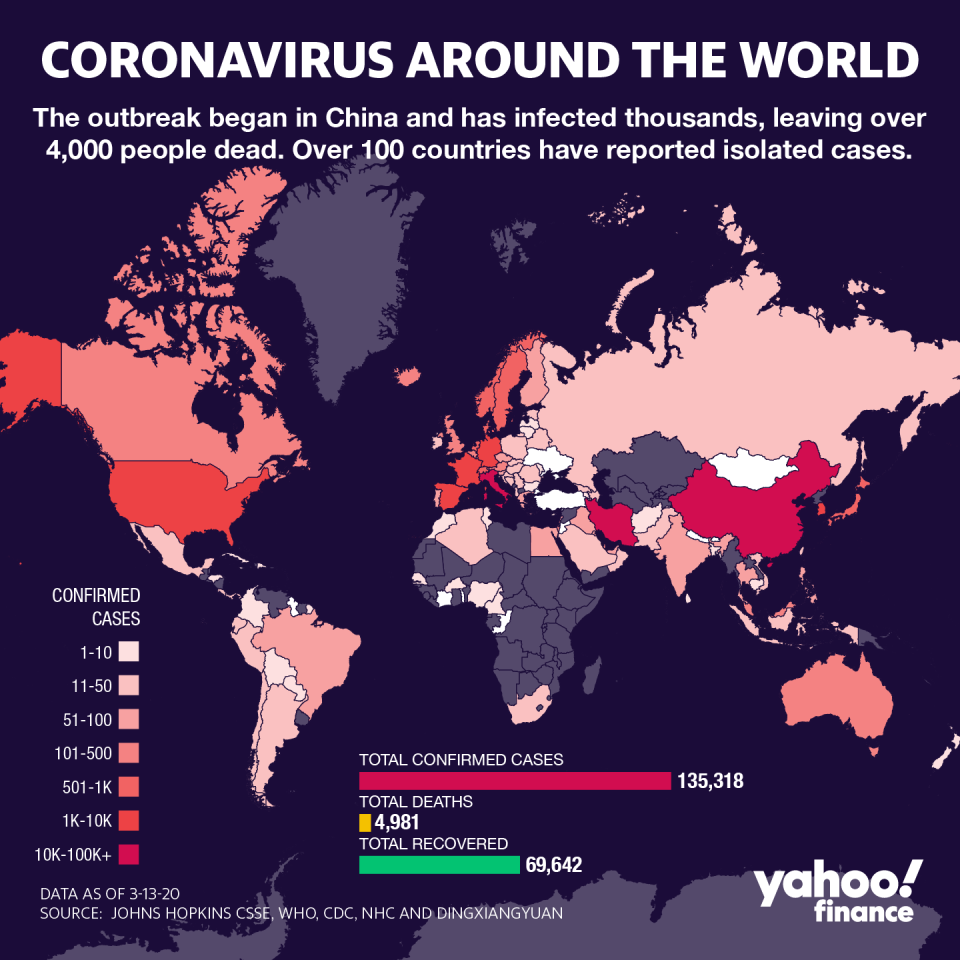Markets in for rocky ride as US extends coronavirus flight ban to UK and Ireland

Markets are in for a rocky ride over the next week after US president Donald Trump extended his travel ban to the UK and Ireland.
The US has more than 2,700 confirmed coronavirus cases, with 54 deaths so far. In the UK, 37,746 people have been tested for coronavirus and the total number of confirmed cases has reached 1,140. As of 14 March, there have been 21 deaths.
READ MORE: Coronavirus risks pushing hotel, cafe, and bar businesses into extinction
The extension of the travel ban is set to hurt oil prices (CL=F) (BZ=F) and further smash airlines, which have already been battered by the ban and multiple countries placing their citizens under lockdown.
On 12 March, European stocks suffered it biggest sell off on record and further developments of travel bans, lockdowns, and social distancing are likely to exacerbate the economic impact of coronavirus. Oil, at one point, crashed by 30% and is still hovering around the $32 per barrel mark — down from the mid-$50 level a month ago.
While governments across the world are collectively pledging trillions of dollars worth of stimulus measures to help global financial systems navigated the unprecedented effects of the pandemic, investors are still prepared for market swings since events are rapidly developing.
READ MORE: Coronavirus: UK banks push to scrap tests to prove they can cope with crisis
Britain’s biggest banks are also allegedly pushing the Bank of England (BOE) to scrap the next series of stress tests amid the rapidly developing challenge of the coronavirus pandemic.
US futures, which European stock markets usually follow closely, are set to all open over 1% lower on Monday.
Aviation in turmoil
While every industry is going to feel the effect of the coronavirus impact, the travel industry are acutely at risk in the current climate.
The International Air Transport Association (IATA), an aviation industry trade group, said that airlines could lose between $63bn (£50bn) and $113bn in revenues as a result of the coronavirus outbreak.
The prediction represented a sharp jump from last month, when it estimated that the industry would only lose $29bn.
So far, the coronavirus pandemic pushed airline Flybe into collapse, risking 2,000 jobs while Norwegian airlines (NAS.OL) up to half its workforce could face “temporary layoffs” as it cancelled more flights over the coronavirus pandemic. More pain in the industry has been reported.
On 15 March, the union of aviation workers GMB called for the UK government help “iron guarantee” jobs for airline workers amid the downturn and also provide state aid, if the situation continues get worse.
READ MORE: Airlines face unparalleled blow from coronavirus outbreak
When the travel ban starts
The restrictions will kick in at midnight on Monday 15 March, eastern standard time (0400 GMT).
American citizens will still be allowed to return home to the US but they will be "funnelled" through selected airports, according to Vice President Mike Pence, who is charged with running the US response to Covid-19 virus.
The announcement came as the White House said Trump had tested negative for the coronavirus. The US president underwent a test days after hosting a meeting at his Florida resort with a Brazilian delegation, some of who tested positive.

Acting Homeland Security Secretary Chad Wolf said the travel ban was extended because of the growing outbreak in Britain.
In response, a Foreign Office spokesman said: "This is a decision for the US. We are working to provide as much information and support to affected British nationals as possible.
"We continue to coordinate closely with the US and other international partners on the global response to coronavirus."
What authorities say about travel bans
The ongoing coronavirus pandemic has affected millions of people worldwide as the World Health Organisation has reported cases in 135 countries.
As a result of Covid-19, the Foreign and Commonwealth Office (FCO) has issued travel advice warning people against visiting certain countries or areas.
Read more: 'Be considerate' — shoppers urged to stop panic buying
You can visit the FCO website here for the latest travel guidance.
Over the last week, President of the European Commission Ursula von der Leyen said while certain travel controls may be justified, “general travel bans are not seen as being the most effective.” The EU has urged members states, instead, to focus on implementing health screening at borders instead, in order to continue to adhere to the freedom of movement.

 Yahoo Finance
Yahoo Finance 